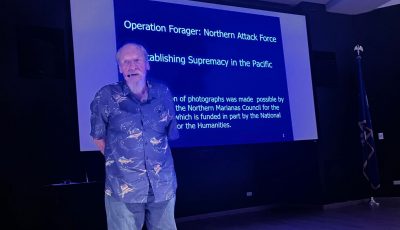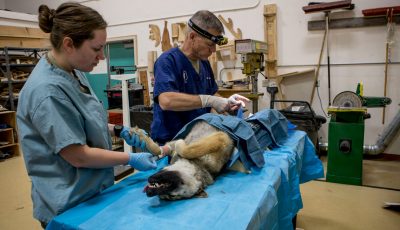IF IPI CW WORKERS ARE SENT HOME TODAY WITHOUT PAYING ¾ GUARANTEE
CCC, US, and CNMI Labor will be asked for explanation
If Imperial Pacific International (CNMI) LLC’s stranded CW workers are sent home today without paying them three-fourths of their wages as guaranteed in their employment contract, the CNMI House of Representatives’ Committee on Gaming intends to call in the Commonwealth Casino Commission and both U.S. and CNMI departments of Labor for an explanation.

Propst
Specifically, committee chair Rep. Edwin K. Propst (D-Saipan) said he would need an explanation why the rules and regulations governing Commonwealth-Only Transitional Workers in the CNMI can so easily be ignored.
Propst told Commonwealth Casino Commission executive director Andrew Yeom last Thursday that he will be calling another meeting requesting his presence, along with his team, CCC board chair Edward C. Deleon Guerrero, all CCC commissioners, U.S. Labor, and CNMI Labor.
“Guest workers in our Commonwealth should be treated with the dignity and respect they deserve, to be treated like family. This is our island way,” said the lawmaker in a letter to Yeom.
Yeom and CCC’s team and IPI chief executive officer Ray N. Yumul appeared before the House Committee on Gaming’s meeting last Thursday.
Yumul said Thursday night that he has been in court all morning and has not had a chance to verify Propst’s statement at this time.
Yumul said he, however, knows that IPI lawyer Michael Dotts is handling the U.S. Labor case in federal court and that they are trying to follow the court’s instructions as a priority.
“It was brought up in court that should employees have to leave the CNMI so as not to violate the rules governing the visa program and to minimize the risk of those people from being labeled as overstayers, IPI is prepared to deliver checks once ordered by the court to either a designated representative, the U.S. Labor or Wage and Hour’s local office, for example, for those people that have to leave,” he said.
In his letter to Yeom, Propst disclosed that IPI gave the CW workers plane tickets to leave the CNMI by today, Feb. 8. He did not indicate how many CW workers were given tickets.
While these workers do want to return to their home countries, Propst said they do not want to leave without getting paid what they are owed. “How can they leave the CNMI with empty pockets, without being paid? Is this fair? Is this legal? Is this humane?” the lawmaker asked.
He pointed out that when IPI hired these quest workers under the CW-1 program, IPI agreed that it will “abide by the following conditions with respect to its CW-1 workers and any workers in corresponding employment.”
These conditions, Propst said, include assurances and obligations of CW-1 employers under the Code of Federal Regulations. He said such provision state that “the employer must guarantee to offer the worker employment for a total number of work hours equal to at least three-fourths of the workdays of the total period of employment specified in the work contract, beginning with the first workday after the arrival of the worker at the place of employment or the advertised contractual first date of need, whichever is later, and ending on the expiration date specified in the work contract or in its extensions, if any.”
Propst said these are binding federal rules and regulations that cannot be willfully ignored. Yet, he said, IPI has done so, and will continue to do so, unless the CCC, along with the U.S. Labor and CNMI Labor, ensures they follow and adhere to these CW-1 rules and regulations.
“If they do not, then they jeopardize the entire CW-1 program for the Commonwealth. Is this fair to other companies who have followed all CW-1 rules and regulations?” Propst asked.
Citing another provision of the Code of Federal Regulations, Propst noted that in layman terms, IPI must pay its guest workers the “three-fourths guarantee” as stipulated in the CW-1 agreement.
Propst said while IPI executives and their attorneys may ask whether or not this was in their actual contract, this should not matter, as this is a rule under the CW-1 program.
“Are they CW-1 workers? Yes. Did IPI agree to these rules and regulations when they hired them? Yes. Should they be paid what they are owed based on the three-fourths guarantee? Yes,” the lawmaker said.
He said the last group of guest workers from IPI who left in September and October 2020 were promised they would get paid, yet to date, Propst said, none of them has received a penny.
“If these guest workers leave in a few days without getting paid, they are likely to suffer the same fate,” he said.
Propst told Yeom that they would like to see the casino industry not only survive on Saipan, but live up to its promises, which include a $7-billion investment. “But it cannot do so when IPI cannot even pay its workers what they are owed,” he said.
Propst said before any further construction at IPI’s Imperial Palace Resort in Garapan continue, before any work moves forward, the CNMI must see that their workers are paid and all vendors are paid.
“Then, and only then, can we have a serious discussion about the future of our casino industry on Saipan,” he said.



























